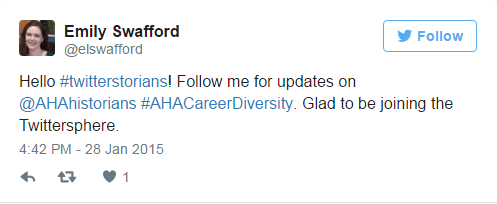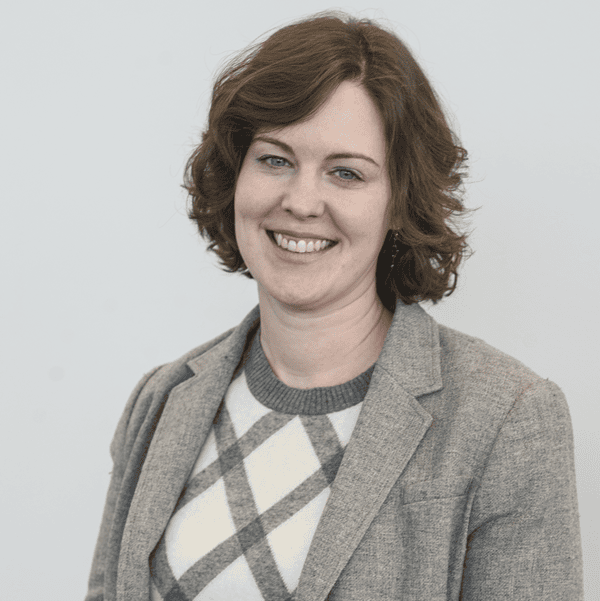This post marks the first in a series on what we’ve come to call the Career Diversity Five Skills—five things graduate students need to succeed as professors and in careers beyond the academy. So here they are, the centerpiece of their very own blog series. Drumroll, please:
- Communication, in a variety of media and to a variety of audiences
- Collaboration, especially with people who might not share your worldview
- Quantitative literacy, a basic ability to understand and communicate information presented in quantitative form
- Intellectual self-confidence, the ability to work beyond subject matter expertise, to be nimble and imaginative in projects and plans
- Digital literacy, a basic familiarity with digital tools and platforms
I think I’ll start with a disclaimer. I didn’t ever not love my job—I found it intellectually challenging and validating pretty much from the first day. But it was also terrifying.
Things I did during my first year on the job that were scary:
- Joining Twitter and live tweeting

Swafford’s first of many tweets.
- Coordinating the Career Diversity for Historians initiative, including speaking about it to diverse audiences (graduate students, career counselors, attendees of the MLA convention)
- Participating in the National Humanities Alliances Advocacy Day and then writing about it in Perspectives on History
- Taking over staffing of the AHA Teaching Division, which meant learning the institutional calendar of the AHA, as well as the ins and outs of issues affecting history teaching, from AP frameworks, to Tuning, to dual enrollment
How did I do it? A large part of the answer is that I deployed “intellectual self-confidence.” For the sake of clarity, let’s define it like this: intellectual self-confidence is the ability to work outside a narrow definition of subject-matter expertise, to think flexibly and creatively about how your existing skills and knowledge can be applied to a problem at hand, to switch between projects as needed, and to learn about new topics and methods as needed. It’s a skill needed to succeed in graduate school, to navigate the career transition that comes at the end of the PhD, and to flourish in careers within and beyond the academy.
A lot of the first year of my job was mastering a vast amount of content that was new to me. Becoming fluent in the conversations around history education in the K–12 arena, learning the meanings of “assessment,” “accreditation,” and “student learning outcomes” and where they came from—that process strongly resembled reading for my oral exams and identifying the questions and ongoing conversations within a field of historiography. Discovering these sorts parallels with my graduate school training brought its own sense of fulfillment, and gave me courage to keep stretching my limits.
While the need for intellectual self-confidence might be easiest to see in the transition to jobs outside of academia, where one goes from teaching and writing to days dominated by strange new things, it is a skill that is also needed to succeed within the professoriate. Ask some assistant professors—they have to master what “assessment” means, too, probably teach a class that didn’t show up on their orals readings, navigate new relationships and structures, and possibly a new town, region, or even country. Just because that transition might look more familiar to many current graduate students doesn’t make it any easier to accomplish.
Honing intellectual self-confidence is already part of the research and teaching work that traditionally comprises graduate education. Navigating a new archive; giving a conference presentation; learning how to be a teaching assistant or leading a seminar—these also require intellectual self-confidence. Indeed, learning to be researcher might be characterized as an exercise in intellectual self-confidence: going from nothing to something, cutting hard-won sentences (or paragraphs or chapters), or reconfiguring an argument mid-stride because a journal article or primary source becomes available.
Of course, there is room to increase opportunities for developing intellectual self-confidence. The first step is often to recognize when graduate students deploy it and to acknowledge it as an accomplishment. The second is to remember that the work of historians is valuable outside of a research seminar and to not be afraid to put it out there: contribute to a blog, write an op-ed. An additional step is often harder to conceive: students should and could explore opportunities to broaden their experiences: work part-time at the library, take a summer internship, sit on a community board. These experiences are not necessarily distractions from the research and teaching training of graduate school; on the contrary, they give students context for their work after graduate school—whether as an assistant professor or otherwise. The experiences might even enrich students’ research, giving them purchase on the wide-ranging usefulness of their graduate education.
The final thing about intellectual self-confidence—it’s not something that you ever master. Once you’ve tried something new or stretched your intellectual boundaries, you don’t get to stop. You don’t get to say, oh well, now I’ve done it. The next stretch, the next challenge is coming soon, if it isn’t already on your to-do list. And the easiest way to know you have intellectual self-confidence, or are capable of it? Try challenging things and don’t let narrow requirements be your only guide to your graduate school experience.
For more information on intellectual self-confidence and the rest of the “five skills,” check out our new page www.historians.org/fiveskills and the rest of the contributions to this series.
This post first appeared on AHA Today.
This work is licensed under a Creative Commons Attribution-NonCommercial-NoDerivatives 4.0 International License. Attribution must provide author name, article title, Perspectives on History, date of publication, and a link to this page. This license applies only to the article, not to text or images used here by permission.



